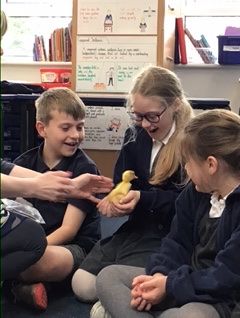Science

|
Why is Science important? |
||
|
Our science curriculum provides pupils with the opportunity to develop not only scientific knowledge and conceptual understanding, but also the knowledge of how these ideas came about, how they continue to grow, to develop, and sometimes even change. We take a ‘hands on, minds on’ approach to science at Godmanchester Community Academy, meaning we not only provide our pupils with practical science experiences, but also explicitly support them in developing the knowledge that underpins those experiences. Our hope is that we are not only teaching children science, we are also teaching them how to be scientists. |
||
|
What is taught and in what order? |
||
|
Plants Identify and name plants (Yr1) Growing plants and conditions for growth (Yr2) Functions of plant parts, transporting water, life cycles (Yr3)
Living things and their habitat Intro to habitats and simple food chain (Yr2) Classification keys and threats to habitats (Yr4) Differences in life cycles, reproduction (Yr5) Classification of living things (Yr6)
Animals including Humans Healthy Eating (EYFS) Body parts and the 5 senses (Yr1) Life cycles, basic needs (Yr2) Skeletons and muscles (Yr3) Digestive system, teeth, food chains (Yr4) Old age (Yr4) Circulatory system (Yr6) Diet, drugs and exercise (Yr6) Transportation of nutrients and water (Yr6)
Evolution and Inheritance Changes over time, offspring and variations, adaptation to environment (Yr6)
|
Materials Identify, describe and compare (Yr1) Use of everyday materials (Yr2) Properties, reversible, non-reversible changes (Yr5)
Rocks Types of rock and fossil formation (Yr3)
States of Matter Solids, liquids and gases, changing states (Yr4)
|
Weather/Seasonal Changes Observe and describe (Yr1)
Light Reflection and shadows (Yr3) How light travels, how we see, shadow formation (Yr6)
Electricity Series circuits, conductors and isolators (Yr4) Volts and brightness, variation in functionality, use of symbols (Yr6)
Sound Formation, vibrations, pitch and volume (Yr4)
Forces and Magnets Movement on surfaces (Yr3) Magnets (Yr3) Gravity, water and air resistance, friction, intro to pulleys (Yr5)
Earth and Space Movement of the Earth, moon and planets (Yr5)
|
|
What will this include? What will I see in a Science lesson? |
||
|
||
When planning and teaching science, our teachers utilise a number of resources to ensure that our science curriculum is both progressive and aspirational and to also ensure that our children develop the ability to work scientifically both whilst gaining and rehearsing new knowledge and also during assessment opportunities.
Below are examples of these resources linked to our Year 5 Earth and Space unit.

